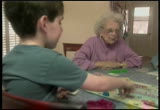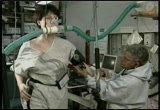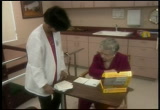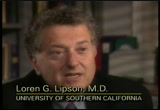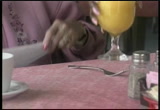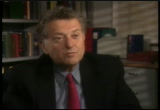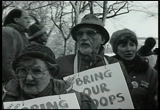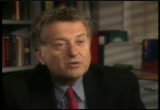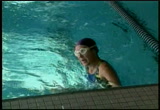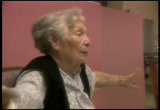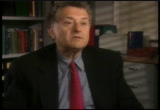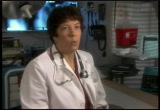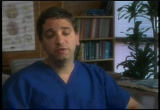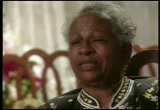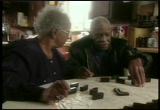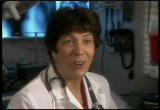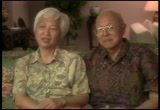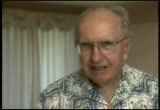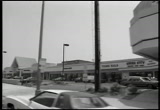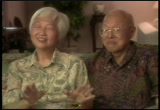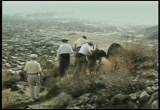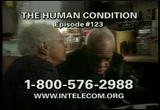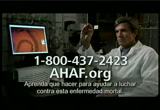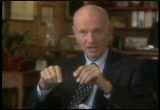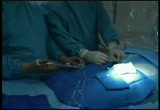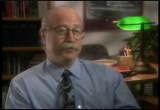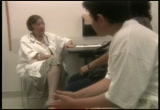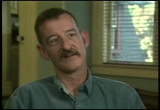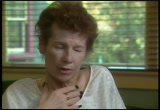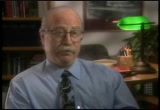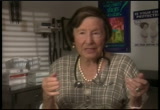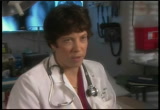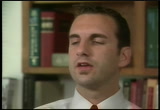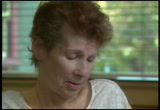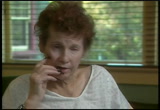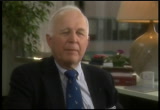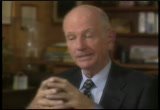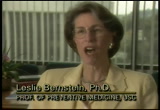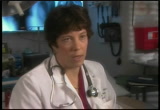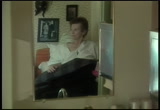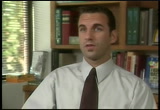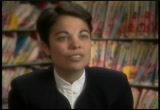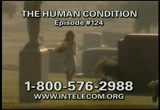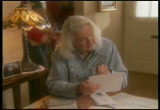tv Democracy Now LINKTV November 21, 2013 3:00pm-4:01pm PST
3:00 pm
3:01 pm
oh, goody. one, two, three, four, five, six... aging is the pattern of life changes that occur naturally as people grow older. contrary to popular belief, aging does not begin the moment you find your first gray hair, nor does it begin at 65. some changes begin at birth and continue until death, others begin at maturity, and end at death. the physiological changes that come with aging are a natural phenomenon and unavoidable. unfortunately... human bodies are a bit like american cars, they have planned obsolescence.
3:02 pm
our genetic blueprint makes sure that we grow old enough to have children, but once that's been done, there's relatively little selection. and so as we grow older, our parts begin to wear out. in essence, we begin to rust. narrator: during youth, when lung capacity is the greatest, muscles the firmest, motor skills quickest, endurance at its peak, the body enjoys its finest years. but after the age of about 30, the body begins an inexorable decline... although it will still be decades before the real effects become apparent. at 30, the heart pumps 3.6 quarts of blood per minute. by 70, the rate is closer to 2.6 quarts. this decrease in circulation causes a loss of physical stamina, but still supplies sufficient energy to carry out day-to-day activities,
3:03 pm
just at a slower pace. strength also begins to slowly decline. at the age of 60, most men have lost 10 to 20% of their muscular strength. the percentage is even higher for women. bones lose minerals, and become shorter. the back begins to slump because of weakened muscles, and the disks in the spine begin to deteriorate, causing the bones to move closer together. as a result, both sexes begin to shrink in height as much as half an inch a year. the brain also begins to shrink with age. mental abilities and intelligence remain constant, but the rate at which the brain processes information slows down, causing slower reaction time and movement. and because an aging body requires less upkeep, metabolism slows down as well.
3:04 pm
the other thing... we wanted to check on was on your feet. they're big. for years, scientific research on aging focused only on its negative aspects. but improved medical care and extensive public health programs have dramatically increased the average human lifespan. over 31 million americans-- almost 12% of the population-- are over the age of 65. their numbers increase every day, as does their life expectancy. one of my cousins, della. if you look at photographs of 47-year-olds in 1900 and look now in the year 2000 at people who are... 78 years of age, they look very similar. and they're probably as robust. i am 95, and i still have some of my teeth.
3:05 pm
and i can drive a car. and if you look at an obituary page of the new york times, the astonishing thing in comparison to just a few years ago, is that there are a tremendous percentage of those people who are in their 90's and now over 100. that was just not something you saw in the past. the census bureau's projection is there will be four million people over the age of 100 in the year 2050. besides improved health care, is there a special formula that accounts for increased longevity? dr. hamer: there's a famous quote from oliver wendell holmes, which is that if you want to live a long life, the best thing to do... is go out and advertise for some long-lived parents. the reason for that, of course, is that aging and dying, like many aspects of our health, are at least partly controlled by our genes. people that have long-lived parents are more likely to live a long life.
3:06 pm
narrator: but genes are not always destiny. studies show that many of the physiological changes that occur later in life can be avoided, or slowed down by choosing a healthy lifestyle long before the physiological changes that occur later in life become apparent. things that help people age successfully are things that our moms probably taught us: eat right, exercise, stay involved and active. people who age well really do seem to be folks who have maintained a lot of physical and cognitive kinds of activity. the fact is, many seniors do not eat adequately, for reasons not necessarily related to their physical condition, or to their economic well-being. dr. lipson: most of our frail seniors in this country are women, because men don't live as long. as a consequence, it's often a situation
3:07 pm
where the woman of the family has cooked the meals, and now she has no one to cook for, so there's no reason to cook. and so you tend to get processed foods or fast foods, some of which have high salt, and some of which have high fat. and so it's important that one be careful, and not get into a situation where you're getting malnourished by eating. ...it's tough exercise, you know? exercise is another important ingredient in the recipe for a long life... but not ju any kind of exercise. dr. lips: walking has been the most importt type of exercise we have found for seniors. i had to throw away a medical journal that talked about the three optimal types of exercise. martial arts... the idea of the "gray ninjas", i just don't know. swimming, which is important, but finding pools is not easy. and the other is gardening, and i'm not talking about clipping a flower once a month, but actually digging, lifting, hoeing, raking. you're going to find that it makes a major difference for your health.
3:08 pm
but in reality, walking is what is done by most. the second caveat is... to pick an exercise that fits the patient's physical ability. if you have someone who has coronary artery disease, you have them run the marathon, it'll be their last act. if you have someone who has arthritis of the hips, riding a bicycle may just not work. so you have to pick an exercise regimen that fits into that individual's limitations. and the third... is you have to pick exercises that a patient will remember. if they have mild alzheimer's disease, giving them a 37-step exercise program just will not work. seniors who are healthy also tend to stay involved... taking part in a range of activities, like political action, or working with children. amelia: working and helping the children, and knowing that i'm doing something for somebody else... that's beautiful... i'm giving of myself.
3:09 pm
and i love it, because i feel i'm still needed in this world. as old as i'm getting, i'm still needed. petra: i would definitely recommend to other seniors, to get out and start something, any little thing they can do to help in any place. i don't think i would enjoy staying home. four walls... no. i just have to get up and go. - a tiger! - a pig! dr. mosqueda: if you look back to textbooks from 20, 30 years ago, which isn't that long ago, they talked about how older adults would, as a normal course of aging, would disengage from society. and the reality is, that's not true. people who are aging happily and successfully are very much engaged with their families and with their society, with their social situation, and those se to be very important factors in aging well. they just planted the magnolia. one has to have an occupation. i will keep stressing that.
3:10 pm
let me give you an example. in our general psych service we had this very nice lady-- she was about 80-- she had a little parkinson's disease, she had hypertension, she had atherosclerosis, and she had some mild dementia, and she was depressed. and she was a concentration camp survivor. and she would have nightmares where she'd start saying, "i won't tell, i won't tell." and she would speak in german, even, and it was very traumatic. and she was moping around, and one of the people in the unit gave her a task. she was in charge of filling out the menus for people who couldn't do it, and filling out her own, and then collecting all the menus. and that gave her so much self-esteem. she started to speak more. she was less nervous. she really... her depression seemed to lift, and she mattered, and had a job. i'm going to be 77, october the 19th. i'm gointo b65, july the 18th. ...and still going. and still going.
3:11 pm
may god leave me longer here. yes. dr. mosqueda: in our ideal world... we would compress all of our diseases and all of our problems into the very last few hours of life. so you'd go through development, you'd live a good, long life, and then when you're 120, you'd just drop dead, and it's not until that last hour that you'd develop diabetes, heart problems and a stroke. the reality, though... is that people tend to get more chronic illnesses as they get older. next, i'm going to listen to your chest. the chronic conditions that affect the elderly often begin in mid-life, or even earlier. take diabetes, for example, a disease that can be kept under control with proper diet and exercise. but if the diabetes is ignored, keptit can be deadly. dr. lipson: after... ten, 15 years, in patients who haven't taken care of themselves as well as one might like, one starts seeing complications.
3:12 pm
the complications i'm talking about are the chronic complications which are largely neurologic and vascular. and these complications are varied. one can see large vessel complications, when i mean large vessel, i mean large arteries which have catastrophic effects, such as heart arteries, the coronary arteries, the carotid arteries, the arteries of the lower extremities. these can lead to stroke, myocardial infarction, and blockages of the legs, and lead to the loss of a limb. about 50% of the elderly population suffers from some form of arthritis, a disease that causes the joints to become stiff and painful. osteoarthritis commonly affects joints around the hands, wrists, hips, and knees. ...this is a special condition where the cartilage of the body undergoes degeneration. the cartilages in the body work as shock absorbers in the joints.
3:13 pm
they enable a joint to function smoothly and normally. human cartilage does not last the lifetime that humans now have. as we get older, the cartilage undergoes qualitative and quantitative changes. older women are particularly at risk for osteoporosis-- a loss of bone density so severe, that a bone will break even with only minor injury. the most common thing we break from osteoporosis is the vertebral body, but when we're talking about gait, it's the hip. and the hip fracture is deadly. if you look at women who are of caucasian background, by the age of 90, one in three of them will have had a broken hip, and during the acute process of the hip fracture, one in three will die. chronic illnesses certainly pose a threat for seniors...
3:14 pm
no one wants to be incapacitated. but even more alarming for many people is the possibility of memory, or cognitive loss. dr. mosqueda: i think the most important thing to first say about dementia, is it's not normal. and in fact, significant memory loss is not a normal change of aging. this is something that the public needs to understand, and health care professionals need to understand, more clearly. while there are little bits of memory loss, maybe difficulty in catching a name as quickly as you might be able to, or forgetting where you put your keys a little more often, those are normal changes of aging... that i certainly am experiencing. but what we say is, when you lose your keys and your car, that's a beginning sign maybe there's someing more going on. so, while memory loss is very common in the elderly, it's not normal. when we talk about dementia, we're talking about a syndrome
3:15 pm
that really involves three things: one, there has to be memory loss, but there also has to be loss of some other area of your thinking. it might be problems with language, or spatial skills, meaning, knowing where you are, reading a map, those kinds of things. it might be problems with judgment or reasoning, and the third component is, it has to affect your function, so you're not able to do the things you used to be able to do. stroke is a cause of dementia, so-called vascular dementia. it's probably the second leading cause of dementia, of cognitive loss in late life in the united states after alzheimer's disease. if alzheimer's disease is responsible for 50-70% of dementia in the u.s. then stroke is probably responsible for 10-25%. and sometimes it occurs after obvious strokes that patient's language and memory system is immediately compromised by the stroke,
3:16 pm
and they never recover to their prior cognitive capacity. sometimes people may have lots of little strokes that slowly pick away at the cognitive status, and lead to dementia. it's the leading cause of adult disability in the united states. it is the second leading cause of nursing home placement after alzheimer's disease. dr. hamer: alzheimer's disease is very common. we used to think that people just got dotty as they grew old, but we now understand that there's a specific disease with a specific sort of brain chemistry involved in the formation of tangles and other problems in the neurons of the brain. and we now know that there is, at least in part, a genetic basis for alzheimer's disease. dr. mosqueda: alzheimer's disease is actually a disease of middle age. we just don't really see it becoming apparent until people get older. there's treatment for it with two medications available; more that will soon be available.
3:17 pm
they don't reverse it, but they kind of ameliorate some of the symptoms. i think the important thing though, with alzheimer's disease and with other dementias, is there's always something we can do. sometimes in health care, we get so focused on treating it, curing it, that we forget about caring for somebody. some loss of memory-- of cognition-- may not be due to dementia. it may be a result of over-medication. over-medication, or what we sometimes call polypharmacy, is one of the biggest health issues for the elderly. it's been estimated now, that about 1/3 of all hospital admissions for the elderly are somehow related to medication problems. that's a horrifying figure, but on the other hand, it means that we should be preventing about 30% of the hospital admissions for the seniors if we get a better understanding of these medication issues.
3:18 pm
dr. lipson: one may find that using that little bit less potent medication which has less side effects may be much better for a senior than using the big gun which also causes big side effects. problems with declining health, or increasing disability can make it difficult for the elderly to manage on their own. about 1 in 5 elderly people need help from another person in performing daily living activities. assisted living can be something as simple as helping people with their medicines, and providing transportation to their doctor's appointments. it can be more than that. it can be assistance with bathing, assistance with dressing, reminder services and cueing. the over 60 health center east oakland provides just such services... for older people who want to stay in their own home,
3:19 pm
but need a measure of support. why we started "over 60" is because we had quite a few senior citizens living in the neighborhood, and there was no clinic in this area. so, what we did... six women got together, and we started "over 60". it was started by seniors. and it was run by seniors. okay, floyd, here's your toast. would you mind moving the paper? i'll cut it. when floyd got sick, and when he came out of the hospital, it was a shock to me. you know, i didn't think it was going to happen to me-- us. but it did, and so... i just had to accept it, and do the best i could. hi! how are you doing? then, when i couldn't do it all by myself, i asked "over 60" for help. basically, there are hours to help you with... your activities of daily living...
3:20 pm
floyd: i like "over 60", because they do everything up there for you. okay, take a step or two. i'm right here. they got the doctors for you, they got dentists up there, they got a foot doctor, they got every doctor up there. if they don't have them there... the regular ones will send you to a specialist. it's always important to stay at home if you can. at home, i can do like i wanna do, mostly. if you're at home, you're with your family. at a rest home, you might go in, and don't know anybody. you don't know what they're going to do. but at home, you've got a family. i'm thankful that we're together, and i hope that we can live a long life together. and i've always thought it was best, for people when they get up in age, to be together, because you've gotten old together, you might as well live together and be happy, and be healthy, and live a fuller life. - did you see it? - yes, we did.
3:21 pm
all right. dr. mosqueda: the number one fear of older adults is loss of independence. "i want to be able to do what i want, when i want, how i want." and even though it seems really nice and cozy for mom to move in into a loving family, mom often feels like, "well, now you're telling me when i have to have dinner, or you're concerned because i sleep in..." dr. lipson: if you're a little bit enfeebled, people feel they have to help take of you. and i've seen people who are controlling types who really end up trying to control their parents, and their parents are trying to control them, because parents do that sort of thing. so that doesn't work. and sometimes i feel a little bit like a family counselor, because i'm dealing with a 90-year-old lady, and her 65-year-old daughter, and they're really going at it over these kinds of issues. and a lot of it then focuses on, "i just want to be independent. and how can i maintain that?" at hollenbeck home,
3:22 pm
one of the country's oldest licensed residential centers, rosaline and chin-yu ip found a way to maintain their independence, yet be assured of support when they need it. rosaline ip: our kids have their own lives, and we felt that when we get older, surely... one day we might... we'll be sick or something like that. and we feel that is such a burden to them, if we were to just live on as usual at home. and that's the first thought that we-- in case we are sick, then we felt this is just the right place, that we would be looked after. i think that applies to, most of us too, who came in. we have about 200 residents here. some are in the residential side, some are receiving nursing assistance in that residential side. and then we have our own nursing unit,
3:23 pm
so that they can make the progression from the residential needs, to a more dependent care in the nursing setting. the beauty is when a person comes in, they do not have to move somewhere else. they can be taken care of from the time they are active till the time they need this skilled care. and many times we'll have couples that come in, or just good friends, because if one of them needs care earlier than the other, they can receive it, and their significant other can visit them, and be by their side, but not have the burden of their care. i really act as a caretaker for my wife, who is a bad stroke victim. and she's fine, she's ambulatory, very social, but she does need attention, because for various reasons, she functions better if i'm around. so therefore, i have my place in her life-- because we enjoyed a nice, long 41-year life.
3:24 pm
having the availability of health care is not the only reason people choose to live in a retirement community. julieta ortiz: when my husband passed away, i still felt very strong that i could take care of my home, my yard, and everything. but then, the community started changing a lot. and my home was an alle and i was afraid at night. i lost my wife about three years ago, and i coped with it for two years. i went out to eat most of the time, my dinners, but the last year i just didn't feel like the drive. sometimes congregate living may be more healthy than just living by yourself. and that's what we see in some of our assisted living facilities. if you stay by yourself you become sort of like a hermit
3:25 pm
and withdrawn, and you lose social skills and relevance. that's really important because, at this age, a lot of people-- their friends have died, their community and support system is changing. and when they move in here, they really develop a new set of friends and support system. we can't let him win again, can we? despite the advantages it may offer, not everyone is eager to move into a retirement community. rosaline ip: he likes all his freedom. he's such a man, and i say, "when are you going to come in?" he said, "yeah, when i finish", this, that, that. then it seems like he takes... his time to finish and he said, "you know, i do not know if i go in whether it will be such a confinement to me." chin-yu ip: just in the back of my mind only, but i did have some business to take care of...
3:26 pm
which took time. jennifer devoll: there is an adjustment, because people are typically giving up space and sort of a schedule of their own. and they're moving into a community where there are certain kinds of routines, courtesies, and schedules that are imposed on them. but then when he finally came in... he was so surprised. there wasn't any sense of... as he thought was like imprisonment. it wasn't like that at all. in fact, hollenbeck has become more than a temporary residence to the 200 people who live here. resident: i stepped across the threshold. there wasn't a thing in there, but i felt like home. julieta ortiz: i've been to catalina twice, to lawrence welk, to a lot of places they take us. i have a rular wking ptern every morning.
3:27 pm
and i participate in a lot of the activities that they have around here. and the best thing is, we do not have to cook our meals and wash up! so we have plenty of time to do what we want. jennifer devoll: so for me, it's been very interesting to get to know older people on a very personal level. and i think the main thing that i've learned, is that there's so many stereotypes about older people, and they really are just people. like people of any other age, they are just all different personalities, d they havall different traits and quirks, and positive aspects that any other age group has. they are not to be stereotyped. they're just individuals. i hope i can live at least to be 100. really, i do.
3:28 pm
3:29 pm
3:30 pm
3:31 pm
a century ago, most people spent their last hours of life at home, surrounded by family and friends. death and dying were looked upon as a normal, accepted part of life. a child growing would probably have seen grandma or grandpa in the bed, fading away, saying goodbyes... slowly saying, "no more hunger, i don't really want to eat..." and dying. and where that would've been a common experience for people, in more recent generations, death has been in the hospital. and there have been machines and tubes and masks and things that say basically, this is not a place the family belongs. and you can't hold the hands, and you can't caress, and you can't say your goodbyes.
3:32 pm
in fact, for many people, death is a subject they shove to the very back of their consciousness, not wanting to think about the subjt until they are elderly. but, as too many families have learned, death is no respecter of age. a minority of people in this country die with a will at all. so it's clear that for many people, planning for what will happen when they're gone raises issues that they just don't want to deal with. critical care decision making, in advance, using an advance directive, is a topic that most older people are very comfortable with. the folks who are skittish and nervous about it are their grown children. so we have this disconnect in most families where the elders would like to get this topic out on the table, and their kids flee from it. i think it's best raised as early as possible, because if it's raised in the context
3:33 pm
only of a particular illness, the tendency is to focus on... the treatment techniques and so forth that are particular to that illness. but what's really at issue is what are your values? what are your objectives? what do you feel about... the prolongation of life itself? are there things which are very important to you where you would really go through a lot simply to be alive at some future date? an advance directive really does two big things. one-- it allows you to state your healthcare preferences. if i'm ever so ill that i can't speak for myself, these are the things i want done, and this is what i don't want done. the other thing it does is it allows you to appoint somebody to speak for you. so i have an advance directive. i've talked to my husband about what i want and he has the authority to speak for me
3:34 pm
if i ever can't speak for myself. and we have to recognize that the preferences you express now, the decisions you would make now, are not... carved in stone, and they're going to change as you change. very few 30-year-olds would make a choice to go on living if they would have substantially reduced physical functioning. a lot of 80-year-olds who already have substantially reduced physical functioning recognize that they could live with a little bit less. they could use a walker. they might even be in a wheelchair, and as long as they are interacting and enjoying many aspects of life, they'd be happy for that. the subject of death is often as uncomfortable for doctors as it is for the general public. their focus is on healing and saving people. death is the enemy. dealing with death and dying, which doctors and the rest of the world used to just try to avoid, has been a subject of much thought, educational efforts, and emotional struggle on the part of the health professionals.
3:35 pm
one of the most important things i think we can do as healthcare professionals are help people through the dying process. it's amazing to me how many physicians have never been with somebody when they've died. and i think that speaks to health care and technology these days. there was a time when doctors did not always reveal that a patient's condition was terminal. it was a judgment call, based on their perception of the situation and the patient's ability to handle the information. and some would concede that if they were dealing with a man of affairs, a major businessman, they would expect that person, that man to be both levelheaded enough and to have such weighty considerations that if he had cancer, he ought to know, because he would need to make arrangements. but for the rest of us in the hoi polloi, the sense was, doctors knew best. we have become much more honest. basically, you know, patients' rights, patients' autonomy has been increasingly realized.
3:36 pm
so we no longer really feel we have the right to withhold information from them. so certainly, much more frankly and much earlier, we tell patients about fatal diagnoses. i was just on a shopping line in a grocery store with my young son. he was three at the time, and i was holding him my arms and facing forward, and he was facing backward, and all of a sudden, he said, "daddy... man fat!" i turned around. of course, there was this gi-hugic man... behind me. and i said, "oh, sorry." and he said, "that's okay. at least he was being honest." and that, of course, is the truth. honesty is indeed the best policy. and we have to disembody ourselves from all these walls we put up so that we can hold someone's hands and say that we're going to be there with them and for them, and we're going to help them through this... because we can. i deal with fact, however... gruesome or unpleasant,
3:37 pm
much better than i deal with not knowing quite what the truth is or what the facts are. i'd much rather be told. but what if the person to be told is a child? barbara korsch: we've become much more open with children, too. we've done studies which show that children who have information shared with them, even about bad prognoses and almost certain fairly imminent death adapt better than if they're excluded. they have all kinds of antennae by which they perceive when things are bad, and if you don't include them in discussions and decision making-- at their level, obviously-- they feel isolated, they feel nobody knows how scared they are, how sick they are. so in general, we've become very open, but we try to temper it to the patient. in her crusade to combat aids in her community, sandra mcdonald has faced many heartbreaking moments, but none more difficult than the day she learned that a bright, 10-year-old bundle of energy had aids.
3:38 pm
the family decided not to tell him. i could not bear having him go through the pain of rejection or... being laughed at or-- i didn't want to steal his life. i didn't want to tell him. about two or three months later, he came into the office and said, "we have to have a conference. you know, we have to have a conference." i said okay. i said i bet it's about money or tennis shoes. he said, "no, no, we have to have a conference." he came in, came around to the desk, put his arm around me, and he said, "ms. mac... i know i have aids. yes, i know. i know i have aids, ms. mac. no, daddy didn't tell me. i know. i know i have aids. yes, ms. mac, but i'm not gonna die. i'm gonna here to take care of you. i don't want you to worry, ms. mac. i'm not going to die. i know it. it's all right, i know it." i can not tell you that emotion in me. i can never, ever in my life describe what happened in that moment.
3:39 pm
here is a kid who has more courage and strength than any adult i've ever dealt with and the faith that he was going to be all right. children don't despair the way adults do. they're always ready to do something fun and enjoy the time they have much quicker than the adult who sees what lies ahead. children are living in the here and now. people's reaction to an impending death sentence does not always follow a predictable course. donald bustle: emotions run the gamut from anger, denial, acceptance, back and forth at any time. and a lot of times, different things that happen in the resident's life at that time, maybe with family issues or maybe even with medical issues or suffering-- it changes. it goes up and down. i've never felt any anger. i've never felt despair. i've never felt... depressed in the classic sense of depression. as i said, i deal with everything
3:40 pm
on a very practical level. as the pain intensifies or the deterioration of the disease progresses, they may go back to fear-- fear about the pain, fear about what's after life, things that one might-- we all think about in front of our own mortality, but fear of, you know, if someone is going to be there, are they going to be remembered... fear of... of unfinished business... of tying up loose ends, you know, from all aspects, you know-- family, friends... significant others. david goldstein: when someone hears that information-- actually there have been studies, and they're most frightened about being abandoned. that's their number one fear. i got response from people that i would never have thought i'd got response from. but most of the time the people that turned out to be the best friends were the people that had really been best friends all my life, if i think about it. donald bustle: family and friends mean everything to most individuals, and especially in times of death and dying.
3:41 pm
a lot of times the patients, you know, because of... maybe of lack of... because of the lack of support, they're embarrassed, or they feel ashamed, or... they try to play it down, a lot of them. and that even hurts more when you see them that they're-- they try to brush it off, like, "oh, it's okay, you know. i'll be okay, you know." that's sad. that's sad. the second greatest fear is of the pain that may be associated with dying. when we have to tell somebody that they have pancreatic cancer and that we have no treatment for them, we shouldn't be saying we have no treatment for them. we have treatment for them. we're going to keep you pain-free. we're going to keep you as comfortable as possible, and i'm going to be with you... to the end. i'm going to be there with you. it is now legendary in the medical system how undermedicated people are, how much unnecessary pain they go through because the healthcare system is biased
3:42 pm
against an aggressive use of pain medications. and there's no reason to be biased in that way. there are well understood standards for stepped pain care, and you can state in your advance directive that you want the most current practices in pain control applied in your circumstances, if you should need that. and you want your healthcare team to consult with an expert in pain control and pain management. it's not just pain. it can be suffering, discomfort, distress at the situation, that needs to be addressed. depression. all of these things, we need still to do a lot of work on. so i think we've set the framework, and there's momentum towards realizing that the full court press-- the notion that every patient should have resuscitation-- just doesn't make any sense. it doesn't serve the patient, and it's self-defeating
3:43 pm
because what it does is it takes what is a part of life and turns it into a part of a mechanism of medical care. admittedly, it's difficult for a physician trained to save lives to accept goals that are less aggressive. but what if that is the patient's choice? what if they are unwilling to prolong an existence that, to them, is subhuman? i think it was fair to say that in the '70s and probably into the '80s, the attitude of the medical profession, on scientific and medical grounds, on psychological grounds, and on their perception of the legal grounds, was... not only should we be doing everything possible to prolong life, but we would be at great risk legally if we didn't, and that it would be very hard, for example, once you begin a course of treatment with a patient--
3:44 pm
once you hook a patient up to a machine-- to withdraw that machine because "you'd be killing the patient," and that would be legally wrong, and it would also be, psychologically, just impossible to deal with. i mean, you would feel the guilt of having done that. and through the leadership of a number of people, i think we have come to realize, on a formal level, that that's really wrong, that the use of technologies has to be evaluated in each case in terms of the ends that are possible with this patient at this point in an illness. how long do you maintain life support? what kind of resuscitation are you going to do on a child who has a progressive, painful, debilitating illness? you know, if they get a pneumonia or their heart fails, how far should you go in the resuscitation? so, as we have more really dramatic modalities of treatment, those decisions come up all the time,
3:45 pm
not just in older people, but in infants, too. the decision rests principally with the patient and family... again, in an interaction with the doctors, but ultimately, that decision is one where the patient should be entitled to make it herself. laura mosqueda: one family that i worked with had a father who was clearly dying. and as he became more ill-- he was always a very forceful, head-of-the-household kind of guy-- he was pretty clear about his wishes. and... for a number of reasons, two of the children had a lot of guilt about unresolved issues with their dad, and because of that, they wanted to keep him alive as long as possible. and what it really took was a family conference. at that point, he was really no longer clear enough to talk to us, so it was just me with the four kids. and what we were able to understand from the family conference is dad's wishes were to go peacefully and quietly
3:46 pm
and not be kept alive. i think that if we had not had that conference and all come to that understanding, that after his death, there would've been a lot of conflict among the kids, a lot of finger pointing. "you let him go too early." "you were going to make him suffer," et cetera. that actually didn't occur. and so i think helping them through that, i hope, led to some emotional peace for the children after he passed away. hilary also made her intentions clear to her three children and her 82-year old father. his attitude to things like this is exactly the same as mine. he said the minute you start to become dependent on other people, that's when you need to get out of life. she'd made her decision that she was at a point... in her life that she was ready to let go, that she was ready to die. so, mentally, she was there. after spending a few weeks with her, it became very clear that physically she was not there.
3:47 pm
and that presented a unique situation because often it's the reverse. people are physically there in terms of being close to dying, but mentally aren't prepared to do that yet. so we had a long conversation one day, which i also remember well, and i basically said to her, "hilary, you're not going to die any time soon. your body's just not ready." and so she decided that she would try medications to fight hiv and see what would happen. i went on the medication for seven months... and i didn't have too many side effects, and i was doing quite well. but the quality of my life changed dramatically, principally because your focus disappears completely, your ability to concentrate, all those sorts of things that affect the quality of your work. as she began to physically stabilize, she realized that her memory, her concentration,
3:48 pm
her ability to complete tasks was not the same as it used to be. and this was extremely important to hilary, to be able to do these things. hilary bennett-coles: i'd put on a lot of weight-- which i was very, very unhappy about-- with the medication. and how you feel about yourself is important, even if it is, as we all know, it's not important in the scheme of life at all. but it upset me a lot. and so, at that point, she decided to once again enter a hospice-type situation and prepare to die, essentially, knowing this time that it would take some time for her body to catch up to her mentally. i went through a period of being very suicidal and very depressed on the medication. and was just not happy at all. and when i made the decision, even though other people were upset for me that i'd made that decision,
3:49 pm
they sort of tried to understand it and work with me. but i've not been depressed since, so i know it's the right decision for me. it was a personal demon for me to have to deal with that, and, you know, i openly talked with hilary about it. i mean, no one knows what they would want to do until they were in their shoes. and that really is what helped me kind of deal with my problem with that, with her. is there a line beyond which a doctor should not venture? amongst several of my interests here at johns hopkins has been a concern that doctors are accepting both "do not resuscitate" orders and a willingness to think about killing patients in a fashion that we think is a slippery slope to killing more patients, to ignoring the value that sick patients still have to themselves and the world, and ultimately to the coarsening of the character
3:50 pm
of the doctors who think in that way. alex capron: like anything, we're always dealing with a swinging pendulum, and in some cases, we probably go too far. and there's always a risk that while many of the older doctors today had to be schooled out of the "do everything" view, some of the youngest doctors coming along who've never experienced that probably are too much in the other direction. but... i don't know if the pendulum will ever come to rest right in the middle. we're always dealing with a social movement, as it were, of which medicine is a part. some people believe that the ideof patient self-determination should be extended a step further: the step of saying the patient should not only be able to refuse treatment, but also demand one particular intervention which is the administration of a lethal substance that would in effect end the life-- be used not just to relieve pain, but to achieve a painless death, and i don't see it that way.
3:51 pm
we work with dying patients all the time, and sometimes we have to surrender to the process of nature that is carrying them off. but that doesn't mean that we have to betray them in that process. and i consider physician-assisted suicide to be a betrayal of patients rather than a support of patients, to the ultimate surrender to the realities of this illness. most of the pressure for active euthanasia or physician-assisted suicide comes from people-- and often in an anecdotal way-- who have experienced a death in the family which they should never have experienced, where treatment was given over protests, or in a mindless sort of way, and maybe the family wasn't protesting. they were just in agony and didn't know that it was really their right to insist that it not go on. and those stories are very moving, and they should not have happened, but we don't need to change all the way to physician-assisted suicide
3:52 pm
or euthanasia to avoid those kinds of problems. paul mchugh: the development of the hospice centers, the sense of being with patients through the several steps in the treatment of their illness-- all of that has come in part because we are interested in helping to make the dying person as comfortable as possible, as supported as possible, and as coherent as possible during this condition. hospice care is a gift from god in the viewpoint of most families and dying individuals who can have that. it's palliative care by people who are skilled in giving it. it often includes a spiritual and emotional component, but the tragedy is that hospice care is underfunded and is really an option
3:53 pm
only for people who are in very steep decline because hospice-care providers can get reimbursed only when their caseload averages less than six months' survival. research studies comparing hospice care to the usual support a dying patient receives in a hospital setting have provided some interesting insights. leslie bernstein: i was involved in a randomized, controlled clinical trial of hospice care that was conducted in a v.a. hospital in los angeles county. we found much greater satisfaction with t type of care the patient received, both from the patient's point-of-view and their significant other's point-of-view. we thought we would see differences in pain management because hospice has this very... futuristic outlook that you manage the pain in any way you can, whatever drugs are required. but what we found was that the levels of pain
3:54 pm
and the pain experience of the hospice patients was really not too different from that for the other patients in the hospital. because of that, we went back to research how pain management had changed at this v.a. hospital over time, because what we suspected and what we were able to prove was that having a hospice in the hospital changed the way pain was managed by other units in the hospital. hospice care can be provided in the home or in specialized care settings. typically what'll happen is we help them set up hospice in the home, which allows a number of services to take effect so that they have more nursing available, they have some home help available, they have assistance with paying for medications that relate to the illness that's causing them to die. you have options, as their primary healthcare provider, to either stay with them as their doctor,
3:55 pm
or you can use the hospice doctor and sort of turn care over to them. personally, i usually have a relationship with my patient and the family, so it's better for me to be with them, since we all know each other, and we're working together. the carl bean facility that hilary calls home so serves 24 other patients. the nurses are wonderful. at least, i've found them wonderful. and... the chef, for example, because i don't eat, will call me up and say, "well how would you like to try a little bit of this?" trying to increase my appetite. toward the end of life, the pace changes. hilary bennett-coles: i could interact a lot with patients if i wanted to, but... i just... i'm not very sociable at the moment. if anything, i'm extremely lazy, and from being a person that was... sort of hyperactive all my life, it's very strange for me to suddenly have all this time.
3:56 pm
i've watched a lot of very bad tv. donald bustle: she's definitely end-stage of her illness. the lab values are really much worse as far as her "t" cell count, and her viral load is elevated. hilary bennett-coles: that's another thing which i've noticed i think makes a big difference. people that are married or have a partner seem to deal with it slightly differently to those people that are on their own. and... which makes total sense, you know. you've got someone supportive people acquire an enormous amount of stuff throughout their life, and what i find really helps people is addressing that stuff, to put it in a simple way. one of the things that's important to me is getting to know people before they get to that point, so that we can make sure that when they are physically letting go, we can still continue the things that they're passionate about. so really, it's addressing a lot of the life stuff with family and friends, and also continuing to do the things
3:57 pm
that made them happy all along. for hilary, the goodbyes have been said, the "stuff" has been dealt with, and now she's just waiting. i go from day-to-day... and i was hoping i'd be gone by now, to be honest. this thing is taking more time than i hoped, but that's all. there's nothing else i can complain about at all. physically, when people are ready to let go... it's difficult to describe in words, but... there's a physical calmness. their body... just very slowly begins to shut down in a quiet way. i could tell you many stories of when the kid looks at the parent and says, "i'm going to be okay now, mom. take care of my brothers." he went to a window-- this is 2 or 3:00 a.m. in the morning-- and his daddy says he started having a conversation, and he said, "something about me stopped me from telling him--
3:58 pm
asking him who he was talking to or telling him to come to bed." and he said this conversation maybe lasted 15 minutes. said when he came back, and they were sort of in the bed together, 'cause, you know, he was not feeling good, he said, "son, who were you talking to?" he said, "i was talking to god... and he told me to tell you that everything is gonna be all right." within an hour, he was dead. "the human condition" is a 26-part series about health and wellness. for more information on this program and accompanying materials, call: or, visit us online at:
3:59 pm
ox?tññogñgñgoñoñ materials, call: woman: i've had a long marriage, jobs, kids. then the grandchildren came along. it took hard work and a lot of planning. but one thing i didn't plan on was macular degeneration. it's stealing my eyesight and my independence, and the disease will reach epidemic proportions as my children age. call 1-800-437-2423 for free information from macular degeneration research. 1-800-437-2423.
4:00 pm
102 Views
Uploaded by TV Archive on

 Live Music Archive
Live Music Archive Librivox Free Audio
Librivox Free Audio Metropolitan Museum
Metropolitan Museum Cleveland Museum of Art
Cleveland Museum of Art Internet Arcade
Internet Arcade Console Living Room
Console Living Room Books to Borrow
Books to Borrow Open Library
Open Library TV News
TV News Understanding 9/11
Understanding 9/11

